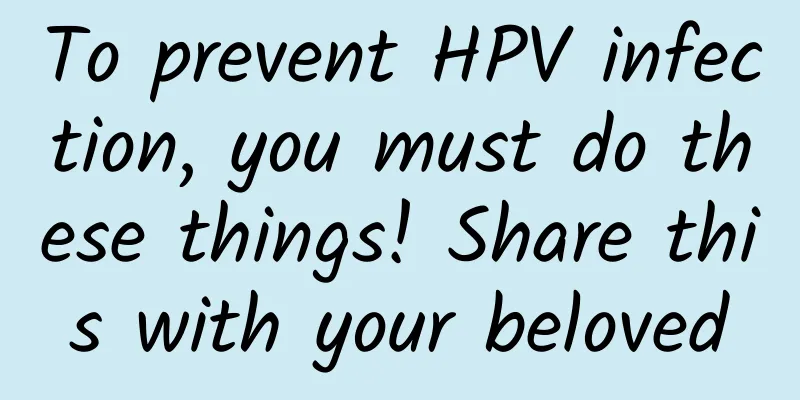To prevent HPV infection, you must do these things! Share this with your beloved

|
Cervical cancer, a "killer" of women's health, has shown the characteristics of increasing incidence and younger onset in recent years. To prevent cervical cancer, we must first understand the HPV virus, as well as related vaccinations and cervical cancer screening. The gynecology experts at Hunan Guangxiu Hospital will answer your questions one by one. 1. What is HPV virus? The Chinese name of HPV is "human papillomavirus", and more than 400 different subtypes have been identified. According to the benign and malignant characteristics of the diseases that can be caused, HPV is divided into two categories: low-risk and high-risk . Common low-risk HPV types include HPV6, 11, 40, 42, 43, 44, 54, 61, 70, 72, 81, etc., among which HPV6 and 11 subtypes are associated with 90% of skin warts, genital warts, etc. In 2021, the World Health Organization proposed 14 high-risk HPV types, including HPV16, 18, 31, 33, 45, 52, 58, 35, 39, 51, 56, 59, 66 and 68. Among them, HPV16 and 18 have a higher risk of cervical cancer and precancerous lesions . 2. HPV infection routes It mainly includes sexual contact, close contact (such as skin contact), indirect contact (such as contact with infected people's clothing and daily necessities) and mother-to-child transmission. Sexual contact is the main route of transmission . 3. Do I need to do cervical cancer screening after vaccination? HPV vaccine can block persistent infection of high-risk HPV, thereby effectively reducing the incidence of cervical cancer and precancerous lesions. However, the current HPV vaccine is a preventive vaccine, has no therapeutic effect, and does not contain all HPV types that can cause cervical cancer. The Department of Gynecology at Hunan Guangxiu Hospital reminds all sisters that after receiving the HPV vaccine, they must also undergo regular cervical cancer screening . 4. Cervical cancer screening 1. Screening start age: 25 years old. It is recommended to use HPV nucleic acid testing or combined screening every 5 years; cytology examination can also be performed every 3 years. 2. Screening termination age: 65 years old. Screening can be terminated if there are sufficient negative screening records in the past (i.e. 3 consecutive cytology screenings within 10 years, or 2 consecutive HPV screenings/combined screenings, and the most recent screening was within 5 years, and the screening results were normal), and there are no high-risk factors such as CIN, persistent HPV infection, and no history of treatment for HPV-related diseases. Women over 65 years of age who have never been screened, or who do not have an adequate negative screening record in the 10 years before age 65, or who have clinical indications should still undergo cervical cancer screening. Screening of special populations: 1. High-risk women under 25 years old: If they have a history of multiple sexual partners, early sexual life, human immunodeficiency virus (HIV) infection, smoking and other high-risk factors, the risk of cervical cancer increases. It is recommended that this group of people be screened within 1 year after starting sexual life, and the screening interval should be shortened appropriately. 2. Pregnant women: Cervical cancer screening during pregnancy is safe and does not pose a threat to the health of mother and baby. For women who have never received cervical cancer screening, it is recommended to undergo screening during the pre-pregnancy check-up or the first prenatal check-up. The screening method uses single cytology or combined screening. 3. Women after hysterectomy: Women who have undergone total hysterectomy due to cervical precancerous lesions need to undergo combined screening every year; if the combined screening is negative for three times, the screening should be extended to once every three years for 25 years. 4. Screening after preventive HPV vaccination: The screening strategy for the vaccinated population is the same as that for the general population. Hunan Guangxiu Hospital Gynecology Department kindly reminds you: Cervical cancer can be effectively prevented through vaccination and regular screening. If you have any concerns or doubts about HPV infection, it is recommended that you consult a doctor in time and undergo appropriate examinations. Hunan Medical Chat Special Author: Jiang Hongxia, Department of Gynecology, Hunan Guangxiu Hospital Follow @湖南医聊 to get more health science information! (Edited by ZS) |
Recommend
What is the cause of lower abdominal distension in late pregnancy?
Women always experience many symptoms during preg...
What are the effects of drug use during breastfeeding on children?
Everyone knows the great harm of drugs, so the co...
What are the causes of menstrual pain in the left lower abdomen?
People are now under great work pressure, and mos...
What should women do if they have gained a lot of weight in their belly recently?
It is very common for people to find that they ha...
What causes milky white vaginal discharge?
For most women, abnormal leucorrhea is a common g...
What is the reason for brown leucorrhea just after menstruation?
We all know that for female friends, normal leuco...
"Crispy-skinned college student" is on the hot search. Stretching and twisting the neck? The doctor was shocked...
Recently, the term “crispy college student” has e...
What is the best way to tighten the vagina?
As women age, their vaginas will slowly become lo...
What causes women to sweat?
Some women with weaker bodies often suffer from s...
Why do I crave spicy food before my period?
Women's bodies are prone to some changes befo...
Tips on how to treat vulvar itching
Vulvar itching is a common female disease. This g...
Causes of postpartum depression in women
Postpartum depression is a mental illness that wo...
What to do if you have a headache and can't sleep? Relieve headache and sleep better
Headache is a common symptom in life. Many diseas...
What causes itchy scalp during pregnancy?
If you experience itchy scalp during pregnancy, i...
Can I use the Internet while I am in confinement?
Surfing the Internet can be said to be an indispe...









